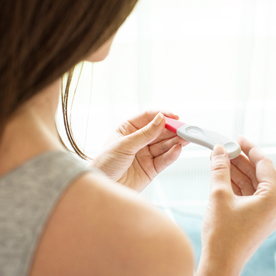
If you’ve been diagnosed with PCOS, you might be searching for natural ways to manage the condition. Fortunately, there’s a raft of information available, especially regarding the nutritional supplements known to aid the reduction of symptoms and support a healthy pregnancy.
But sifting through endless articles that offer conflicting information is overwhelming. Trying to untangle the mountain of often, admittedly, unhelpful advice can be a fruitless and frustrating task.
 However, learning about a select few supplements is certainly worth your time and energy – one of which is folic acid. A growing body of empirical data suggests folic acid may be beneficial for PCOS symptoms, particularly when it concerns fertility. And so, this piece aims to dive deeply into folic acid and shed light on its efficacy for PCOS during pregnancy.
However, learning about a select few supplements is certainly worth your time and energy – one of which is folic acid. A growing body of empirical data suggests folic acid may be beneficial for PCOS symptoms, particularly when it concerns fertility. And so, this piece aims to dive deeply into folic acid and shed light on its efficacy for PCOS during pregnancy.
What is folic acid?
In its natural form – in other words, as it’s found in wholefoods – folic acid is a B vitamin. Alongside vitamin B12, this nutritional powerhouse is hugely important for the production of red blood cells and supports nerve function. Folic acid is also essential for the formation of DNA.
According to UK guidelines, adults need 200mcg of folic acid a dayi. Although there are small amounts of folate in many foods, these are some of the best sources:
-
Liver
-
Broccoli
-
Yeast extract
-
Brussels sprouts
-
Wheat germ
-
Spinach
-
Asparagus
-
Peas
-
Baby sweetcorn
-
Egg yolk
-
Fortified foods (e.g. breakfast cereals)
Folic acid and pregnancy
Folic acid is widely touted for its critically essential role in fertility and pregnancy. While current guidelines stipulate a daily intake of 200mcg, UK women are advised to take 400mcg folic acid supplement every day from the time they stop using contraception until they’re 12 weeks pregnanti.
Folic acid is vital for the growth of a healthy foetus, particularly during the first few weeks to aid the development of spine and nerve cells. Crucially, folic acid helps reduce the risk of serious and relatively common neural tube defects, such as spina bifida and anencephaly, which currently affect one in 1,000 pregnancies in the UKii. Sadly, babies born with such conditions may face a lifetime of paralysis, multiple surgeries, and chronic disability.
According to a recent meta-analysis, taking folic acid during pregnancy also reduces the risk of congenital heart defectsiii. Congenital heart defects occur when the heart or blood vessels grow abnormally before birth, impacting the heart valves, interior walls of the heart, or the veins and arteries of the heart.
Furthermore, evidence purports folic acid supplementation in pregnancy may help to prevent cleft palate and cleft lipiv. These birth defects happen if parts of the lip and mouth fail to merge together adequately during the first 6 to 10 weeks of pregnancy. Typically, surgery is required to correct this disorder.
The NHS reports it’s almost impossible to get enough folic acid just from food in pregnancy, which means supplementation may be the only way to ensure you’re getting the amount you needv.
Folic acid and PCOS
It’s not uncommon for women with PCOS to experience period issues, with many experiencing irregular and infrequent cycles. Notably, there are different types of period irregularities that can trigger a host of confusing and difficult emotions. Simply put, when you don’t have a regular cycle or indeed any periods at all, it signals your body isn’t ovulating as it should, which is one of the most common causes of infertility in women.
Taking folic acid, however, may help manage infertility rooted in ovulation problems for both women with and without PCOS. A study that tracked more than 18,000 women over an eight-year period proposes taking a quality multivitamin supplement containing folic acid could prove usefulvi. The findings suggest consuming a supplement at least six times a week may reduce ovulation problems by approximately 40 per cent. Even more interesting, researchers who spearheaded the study dubbed folic acid as the most likely reasons for the participants’ improved fertility.
Another study, which acknowledged a strong correlation between the use of folic acid supplements and improved fertility, set out to assess how the B vitamin affects hormone levels in women who occasionally fail to ovulate (anovulation)vii. By measuring the levels of female reproductive hormones, including progesterone and luteinising hormone (LH), the investigation concluded that a diet rich in folic acid may lower the risk of occasional anovulation.
Beyond this, a systematic review of randomized controlled trials remarked on the success of combining folic acid with myo-inositolviii. The duo is touted to boost fertility in women with PCOS by improving insulin sensitivity – a common feature of PCOS in which the body is unable to utilise insulin effectively.
A group of women with PCOS who experienced period irregularities took folic acid and myo-inositol every day for 3 months. Amazingly, all the participants had normal cycle by the time the study finishedix. Likewise, an investigation found 72 per cent of women who previously had infrequent or no periods went on to have normal periods after taking folic acid with myo-inositolx.
Easy ways to boost your folic acid intake
Taking a folic acid supplement – either in a quality multivitamin or mineral or single-ingredient product – is a simple insurance policy to ensure your body’s requirements are met. Some proponents suggest folic acid supplementation may even offer a greater support than eating folate-rich foods. This is because manufactured folic acid is more bioavailable (better absorbed by the body) than folate from foodxi.
Foods for folic and folate
Besides supplementation, you could try increasing your intake of foods fortified with folic acid – the synthetic and, as aforementioned, highly bioavailable version of the nutrient. Did you know cereals, like Corn Flakes and Special K, pack at least half the UK recommended daily amount in one serving?
As you can see from the list above, folate is found in many healthy foods, too. However, it’s worth mentioning that certain cooking processes can deplete vitamin content. Boiling vegetables – spinach, kale, and cabbage, for instance – reduces their health credentials since folate is a water-soluble vitamin. One way to avoid this is to steam your vegetables instead of boiling them. Try not to overcook them, either.
Here are some other tricks to cram more folate in your diet:
-
Cook with soy flour: rich in both protein and folate, use soy flour to thicken sauces or make pancakes for a delicious nutritious twist.
-
Eat more wheat germ: sprinkle on porridge, add to smoothies, or combine with flour when baking. Wheat germ is also a great source of fibre and protein.
-
Snack on nuts: peanuts, hazelnuts, cashew nuts and walnuts all deliver high levels folate. A word of caution: nuts are also high in calories, so if you are trying to lose weight, limit your intake to a small handful daily.
-
Add seeds: sprinkle folate-rich sunflower and sesame seeds on porridge, steamed green vegetables, salads, or noodles.
-
Try a veggie burger: besides kidneys and liver, meat isn’t especially plentiful in folate. Veggie burgers made from soy protein, however, are a great source.
-
Go for juice: what you drink can boost your folate intake too, especially if you choose tomato or orange juice.
If you’re having fertility problems, it’s important to seek expert advice. Also, always speak to your GP before taking folic acid.
Want to explore more about PCOS and living with the symptoms? Take a look at the rest of our hub.
References:
-
NHS. (2018). B vitamins and folic acid. [Date accessed: 24/04/2018.] Available online: https://www.nhs.uk/conditions/vitamins-and-minerals/vitamin-b/
-
Action Medical Research. (2020). Preventing neural tube defects. Available online: https://action.org.uk/research/preventing-neural-tube-defects
-
Feng, Y., et al. (2015). Maternal Folic Acid Supplementation and the Risk of Congenital Heart Defects in Offspring: A Meta-Analysis of Epidemiological Observational Studies. Scientific Reports. 5(1).
-
Wilcox, A.J., et al. (2007). Folic Acid Supplements and the risk of facial clefts: A National population-based control study. British Medical Journal.
-
NHS. (2018). B vitamins and folic acid. [Date accessed: 24/04/2018.] Available online: https://www.nhs.uk/conditions/vitamins-and-minerals/vitamin-b/
-
Chavarro, J.E., et al. (2008 Mar). Use of multivitamins, intake of B vitamins and risk of ovulatory infertility. Fertil Steril. 89(3): 668–676.
-
Gaskins, A.J., et al. (2012). The Impact of Dietary Folate Intake on Reproductive Function in Premenopausal Women: A Prospective Cohort Study. PLoS One. 7(9): e46276.
-
Unfer, V., et al. (2012). Effects of myo-inositol in women with PCOS: a systematic review of randomized controlled trial. Gynecological Endocrinology. 28(7), 509-515.
-
Artini, , et al. (2013 Apr). Endocrine and clinical effects of myo-inositol administration in polycystic ovary syndrome. A randomized study. Gynecol Endocrinol. 29(4):375-9.
-
Papaleo, E., et al. (2007 Dec). Myo-inositol in patients with polycystic ovary syndrome: a novel method for ovulation induction. Gynecol Endocrinol. 23(12):700-3.
-
Milman, N., et al. (2012 Nov). Intestinal absorption of folic acid - new physiologic & molecular aspects. Indian J Med Res. 136(5): 725–728. Available online: https://www.ncbi.nlm.nih.gov/pmc/articles/PMC3573592/
Related Posts?
Disclaimer: The information presented by Nature's Best is for informational purposes only. It is based on scientific studies (human, animal, or in vitro), clinical experience, or traditional usage as cited in each article. The results reported may not necessarily occur in all individuals. Self-treatment is not recommended for life-threatening conditions that require medical treatment under a doctor's care. For many of the conditions discussed, treatment with prescription or over the counter medication is also available. Consult your doctor, practitioner, and/or pharmacist for any health problem and before using any supplements or before making any changes in prescribed medications.

Olivia
Olivia Salter has always been an avid health nut. After graduating from the University of Bristol, she began working for a nutritional consultancy where she discovered her passion for all things wellness-related. There, she executed much of the company’s content marketing strategy and found her niche in health writing, publishing articles in Women’s Health, Mind Body Green, Thrive and Psychologies.
View More



